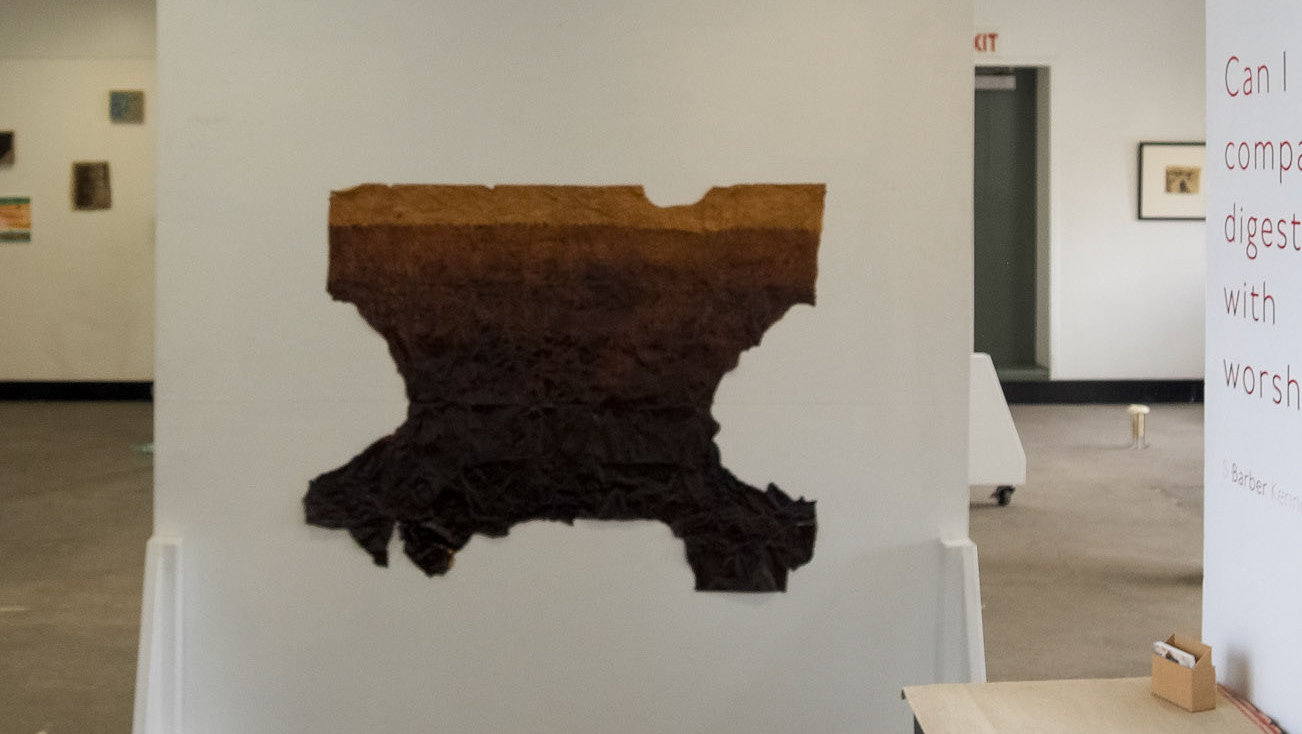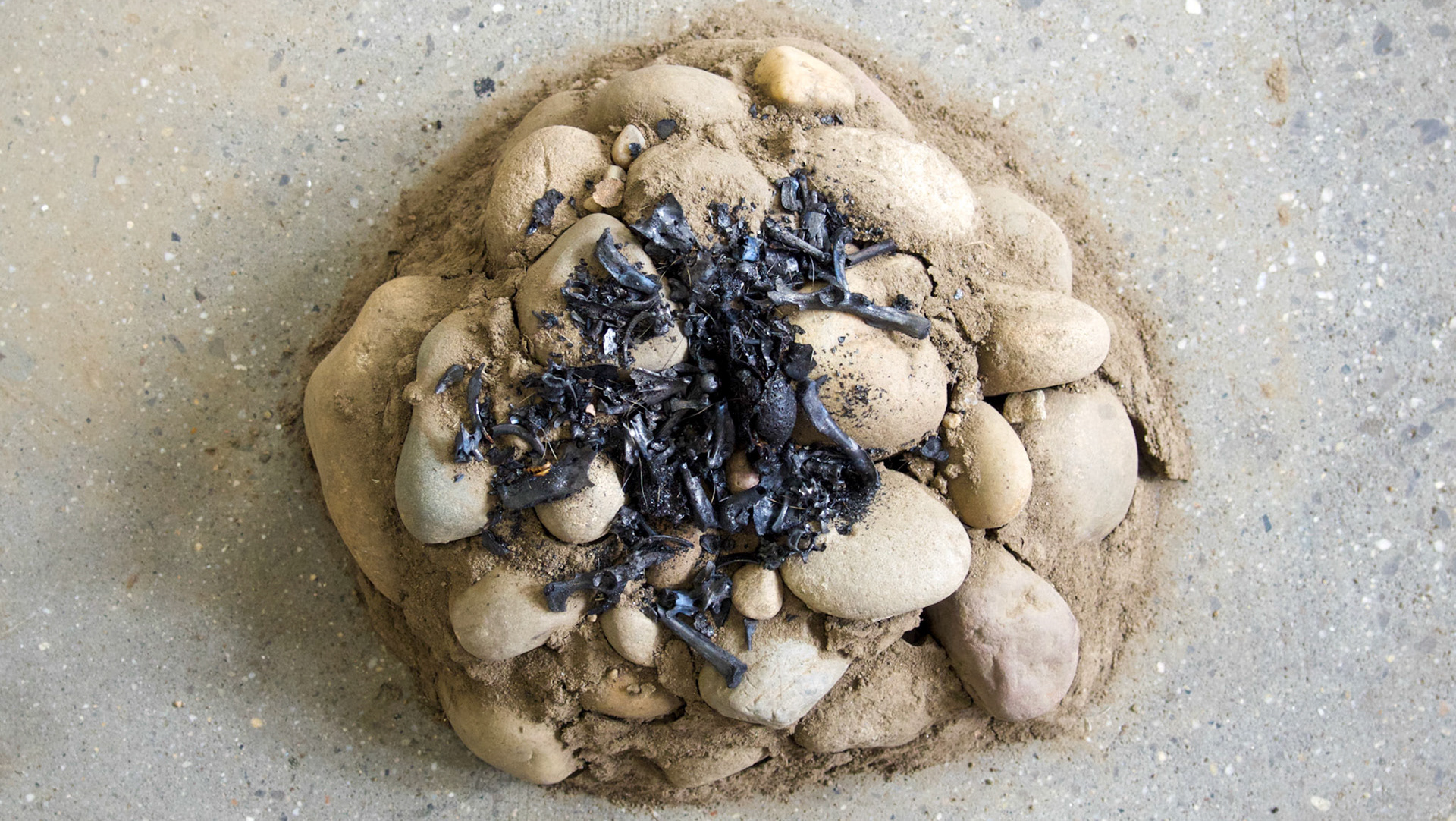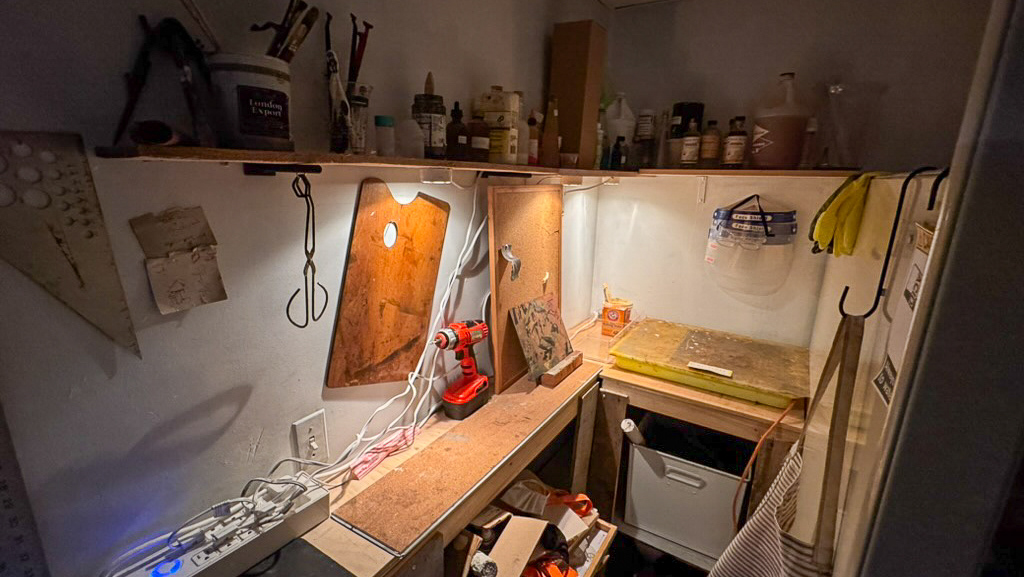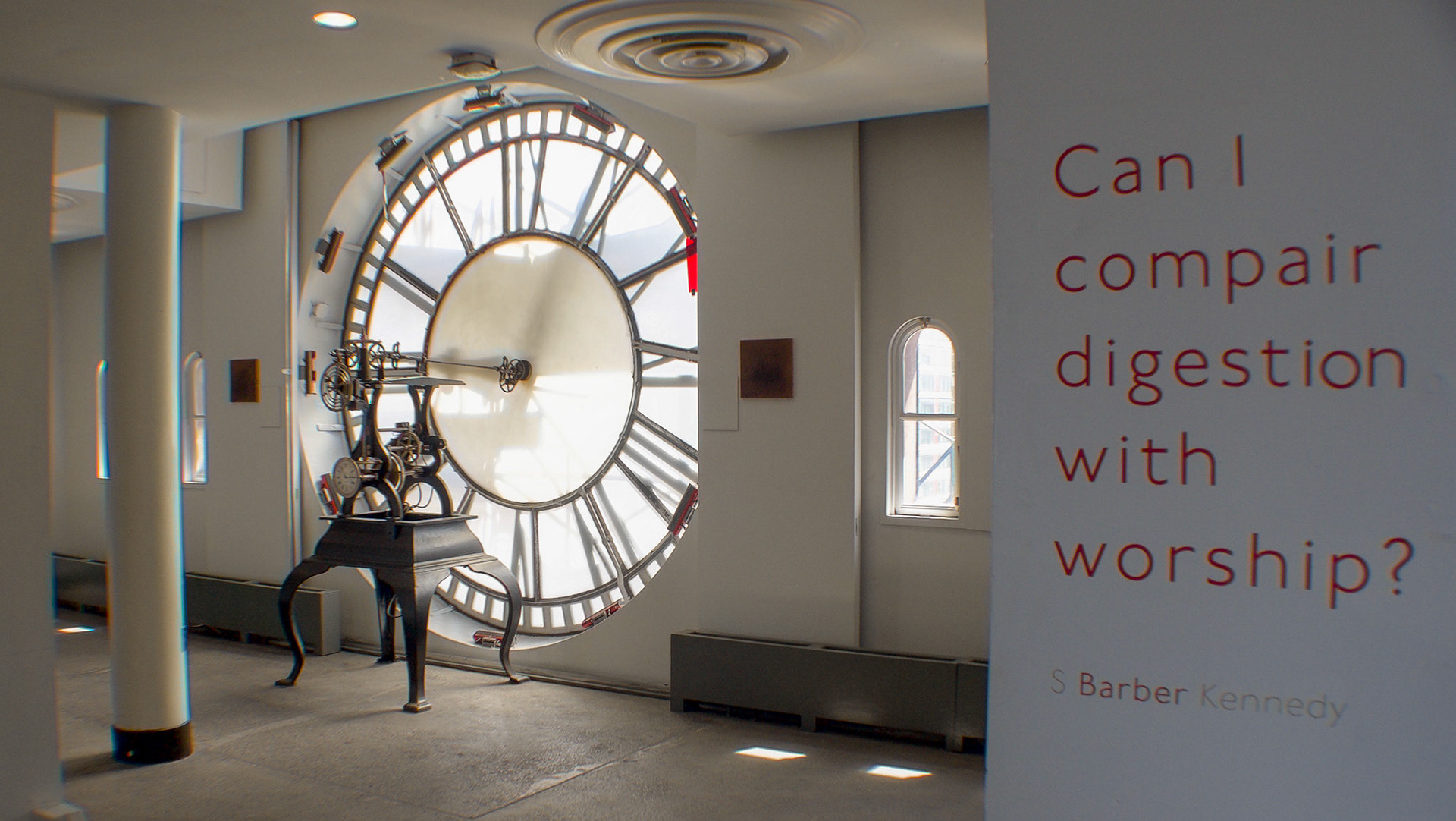“There are only two mantras” said Bernard. “Yum & yuk. Mine is yum.”
Tom Robbins, Still Life with Woodpecker
I was thrown into this world ass-first in 1998. Breach is the medical term. I was born a blank slate that inherited an arbitrary shape. If you've ever watched a sheep give birth to its tethered lamb and sack of fluids that burst at the end, after hours of labor, I, too tethered, emerged from my watery beginnings. And in that precarious moment, my lungs expanded to take my first breath. Cut, still slippery from Baptism, I lay without howl in my mother's arms.
Mum gave birth at home in the loft of our studio. One enters the studio from under the loft. On the left are floor-to-ceiling bookshelves dad had built. Littered among the books, objects are imbued with meaning. To the right is a rail, indicating a boundary between the floor and the building's facade, a six-foot cavern, exposing the dusty basement. Bricks caked in dust disappear into a black radiation box. In a pen, essentially. There on that precipice, our floppy dwarf rabbit named Bunny and I lay.
It was a sparse open space, tempting with possibilities. Globular membranes of decades old brown-and-white paint brutally cover elemental Home Depot supplies. Parallel with the French doors, the stairs up to the loft stand against the wall. Unimpeded but for a single pipe, I’d climb the banister and swing like a monkey, to my mum's horror. The French doors opened onto a two-lot-long communal garden to fill and release the air-equalizing pressure. Oxygen was a welcomed consequence. At the end of the studio was the kitchen. Opposite the kitchen were the stairs to the basement. Blackened wood steps wound their way through a layer of blistered floorboards, bare banisters, and galvanized steel nerves, moving through pipes moving water and waste. Here was my father's workshop. The place was dark, and, among the scattered tools, a chop saw sits with its teeth glittering and drooling in the light provided by two bare bulbs screwed into an impending ceiling. Frames are strangled in place for the glue to sit. Although I wasn't allowed to use the tools, they seduce me with powers of destruction and creation. Actions spill spontaneously from the imagination. Even as a kid, I understood that this is how I played. It is the imagination of a naughty child playing with fire. it is chaotic on the edge of collapsing in on itself.
When I was a small boy, the Barbers and the Kennedys went on holiday together in Italy. In one villa were both my dad's parents, Lucy and Tony from London. And mum’s parents, Ralph and Barbra from Indiana. This is one of the few times that three generations of the Barbers and the Kennedys were all under the same roof. I was five-ish, minus two, my younger brother Baxter must have been three. Our youngest brother Gibson would not be born for another year. I asked mum and grandma Barbra about this holiday to find clarity in my memory. They both remember the lavender fields. And that I had set the table for everyone to eat the Play-Doh fish I had made. I remember Baxter and me sleeping in the attic of the villa. We went up to the attic by ladder through an opening in the ceiling. The attic had a pitched roof. Veering from the middle of the room, one must conform themselves to it by crouching. I specifically remember Baxter and I playing with army men together side-by-side between our two cots. In front of the window we looked out over the pool where we were learning to swim.
One night late, I got up from my cot. one socked foot after the other, greedily grasping at each rung, I descended into the floor down the ladder. At the bottom of the stairs my grandfather was watching a film. I got the impression I wouldn't have been allowed to watch for the violent noises that muffled their way around to me. Hesitantly, I peer around the partition and into the audibly animate room. The living room was warm and dark like looking through closed eyelashes. It was dark in the day and dark in the night, too. From a child's perspective, it was an expansive space, but the atmosphere was damp and heavy. above the wood banisters splinter under pressure as if the stone den was about to cave in.
Committing to crossing, I passed through in a fake haste and caught the film. There was a small boy. He had long hair and muddied skin, exposed but for a cloth. He was not much bigger than me. He was coming from from the grotto a low, hidden, earthly place. He was a feral child like Mowgli. In the kitchen, I asked mum for a cookie and slowly return to the stairs. Shifting earth on his hands and knees, he moved forward quietly—attentively. Like a rabbit attentive to all dangers that await him beyond his hole. The boy knew the abuse was to come. Standing at the threshold between the staircase and the living room, I was held by this image: I am in fear and terror, imagining myself in the same position as the boy. The abuse seemed sexual in nature with no way out. I returned to bed up the ladder and through the hole to the attic. I was in the same physical position as the boy: crouching through his tunnel as I crawl under the pitch, back to my earthly bed.
I, too, like Mowgli, was a wild child without language or a social script. Confused by the civilisation that was imposed on him. I have felt perverse and isolated throughout my life, where I have not seen as others saw. I felt the fool. I had a hard time in grade school. I was different. It seemed to me I was less sensitive than most kids were to pain. Although I was more sensitive to stimulus. In harshly lit rooms of children, I would become overwhelmed. I found it difficult to look people in the eye, preferring to stare intensely elsewhere or at the ground. My attention seemed to be awry on apparently irrelevant information rather than what seemed to matter to people. I’d get fixated and stuck in trains of thought with no lever to change tracks. I had challenges with the seemingly simple things of school, particularly English. Homework would take hours, not because I didn't understand, but that I struggle to put my thoughts into words.
English was not my first language. I did not speak until I was four years old. I made some sound but did not cry. I was diagnosed autistic as a young child with Pervasive Developmental Disorder, and later Asperger’s. There is a silent language of invisible signals and I, like Mowgli, am without those unconsciously absorbed cues and rules of society. It feels like taking a shower with the lights off. I know what I'm doing, but may slip at any moment, stumbling into unperceived social misconduct. I'm always aware, almost anticipating my interlocutor's scorn. Children learn shame from suggestion that their behavior is perverse, that it violates expectations and social norms. To accept my perversity I have formed to want to do anything but what others are doing.
Like an animal of the den I find myself concerned with the moving of soil. Translation of thought to word has been a fickle and dark path. Painting communicates ideas that are impossible to convey through language. In painting, I am in a conversation that transcends the realm of language. A painting is a dialogue between me and the work. Art is the viewer's conversational journey with the work. In this connection, the observer becomes the observed. I paint because it is a direct process, an intimate medium that reduces the separation between myself and others.
I have an infatuation with the thinking material of paint. The only reason I don't finger paint but use a brush is the limited stroke a finger can impart. The predictive coding theory of autism says I have a decreased reliance on previous experiences to process my environment. From one moment to the next, I seem to start from scratch. I need material to spark my thinking I rely on information that is physically present. Paint captures every moment of our affair. Our back and forth. The remanence of our romance is shown all at once.
When I was seven, I went to the “Body World” exhibit at the Chicago Museum of Science and Industry with Mum. Real human specimens were on display. The catalog describes the show as follows: "The Experience is a celebration of the body, mind, and spirit that explores our personal health and well-being." Entering the exhibit, mum and I are engulfed in a dim, shallow, but expansive room to my left and right. Stretching across all four walls and encased in a light box was a glowing alien organism: a complete digestive tract from an esophagus to stomach, intestines, then colon, climaxing with the anus. It is Something I know from illustrations. I'm now aware I've never seen this viscera before. It is in me but has never been seen in light.
The exhibition opens and we enter the biome. Our first encounter was with three adult men around a table like That painting of the dogs playing poker. Cleaved of their skin, they were more naked than being without clothes. Vulnerable and exposed to the world, mere muscle bowls and nerves, left-overs. I had was a visceral bodily feeling, a resonance in a carnal encounter and an uncanny feeling that they should be decaying. I look a naughty shameful leer under the table that lay above my head. Their genitals resting in chairs. They are real. This is not the same kind of intrigue as a synthetic body one would expect at a museum.These men were made of what I am made of. They are here but not here. These people are frozen objects .
We split up at some point early in the circuit. I saw my grandmother in a pair of smokers' lungs. Black tar spiders and venom saturate their flesh. I adore my grandma, and the smell of her cigarettes are a comfort to me. But here I am forced to see the carnage they wreck inside her compared with a pair of healthy lungs that are pink with a bounce, like Hubabuba chewing gum. That definitely impacted me later on, although I was an avid non-smoking child for the next couple of years, come 13. I became a smoker, and health has never since been number one.
I came to the fetus in every stage of pregnancy. The focus of this space was a mother. Her belly was peeled away in layers revealing her child. A baby that looked as though it was due any day. I thought about this woman and her child. They must have died together. It would be a wretched thing to have placed a baby inside her. All these fetus's wished to inspire awe. For me to contemplate the impossible probability of me standing there, let alone that I exist. I couldn't help but wonder, does it matter the impossible likelihood of it? None of these children got to exist and they seem quite serene in their fluid home.
I stood between the adults and the fetus, My age group was not represented among the bodies. At the end of the exhibit I found mum. She told me she was going to sign up to donate her body. This was a canon ball of thought. It dropped in my belly. I don't want my mum up there, stripped as a martyr, exposed for demonstration. I don't even want to see her in a coffin. The idea that she'd be one of those people up on display frozen robbed of her right to deterioration without closure, and this was disturbing.
My paintings are like the Carnival. In high school, I became trouble with a question of “What was the point of art?” My paintings are not art just because it's paint. There must be a responsibility to the position of artist and it had to be social. I've come to think that science offers a place to feel a certainty against our subjective incomprehensibility. And if religion is a place for faith against our subjective incomprehensibility, then art is the place to expose that uncomfortable condition and question what the latter have to offer. My art must be conducive to self-lead creative critical engagement—to come away with a new perspective. Narrative is an effective medium for engaging people, but the narrative is manipulative with the illusion of one coming to their own conclusions. In this way, narrative is often speculative. Painting is a slow narrative: it gives everything at once. In the slow narrative, you subjectively have to find what is interesting. You are a participant in the painting. Spectacles present themselves to view; art is to be engaged. The carnival-like art is not a spectacle. It’s not seen, rather lived in.
It is the Jester who proposes the questions, gaps, and inconsistencies in the mundane every day. But on this day, he is to bewilder. The medieval carnival was The day to ridicule king and clergy, For the Jester is king of the Carnival. A day for copious amounts of food and wine, to fling dung and urinate on the table. The Jester uncrowns the higher functions of thought, speech, and the soul with the grotesque body as the senses are assaulted. The existing world suddenly becomes alien and there is the potential for a Carnival of truth. The grotesque forces an uncomfortable moral alignment or rejection. The subject who is repulsed by the grotesque, must reexamine what they held true before yuk or yum. To be confronted with the awkward absurdity of being a furless, bipedal primate. A subject must reexamine the assumptions embedded in their reactions. They come away with a refreshed perspective lodged back in. I see myself as a jester and a perverted alchemy is my carnival.
I would be picked up outside of my home as the first stop the bus made going to grammar school. the drive from home was 15 minutes. I suppose that's why the bus came to us first. We would pick up every student taking the bus to school. It was an hour ride. And an hour on the way home as we dropped everyone off. It is easy to forget how very long an hour is as a child. If you think about time in terms of a ratio: time happening, and time experienced for a baby alive one hour, an hour is all of their Life. When they have come to be 24 hours old one hour is 1/24 of their life. One hour becomes a smaller and smaller increment of time in your experience the longer you live.
Later on, my younger brother Baxter started school and I would sit next to him in the back of the bus. Mum would remind me I am my brother’s keeper. He would prop himself up on the window fogging it with his breath dozing in and out. Sitting on the school bus one day—looking out the window, at my shoes under the grey vinyl benches—I made goals for what I wanted in life. I would get that tattoo. I would see a genuinely angry band. I would smoke. I wanted to be 16 or 21 forever—hard to decide. But I also feared the idea of forever, so I wasn't set on that one. I concluded that living forever sounded worse than death. The idea of heaven seemed to me as miserable a fate as hell. Infinity sounds awfully boring if all the ups and downs are stretched flat. I wished for the highest highs and the lowest lows. I later came to think it the duty of the artist. Contemplating a sinless beauty, all I find is monotony. Beauty: it is hardly ever free of a forbidden sin.
I was a critical and self-discerning child. But I think I know this fear of forever and monotony began my critical and doubtful approach to the church we attended, if not twice a week, weekly. Like Mowgli, I come from the grotto. From the lowly ground from which bodies emerge and are excavated. Etched on my left shoulder is sand, soot, dust, and dirt. I'm for the beginning and the end. I am a jester for a celebration of the ephemeral. I'm not looking for not the eternal but the decrepit; not cerebral, but the carnal, and that tattoo from the bus, I have it. A jester hat on my right shoulder. It is stripped red and blue with three ocher bells on the end of each ear. From under the hat, three lines penetrate a heart. Bisecting the strings an, f-hole.
I have rejected almost everything I could not see the point in. This could be that I feel the need to know why before I'm willing to conform, but it also sounds a lot like boredom, not that it couldn't be both. Boredom is to feel that you have more worthwhile things to do than what you currently are doing. I was bored a lot, I suppose, as a kid, but that doesn't make me boring. Quite the contrary. In school, on the bus, in church. Maybe it's the impulse control thing. Sitting in church, I thought that anything you are passionate about, involved with, and believe in must stand up to criticism and doubt, for there are endless possibilities outside, but there are only two mantras: yuk and yum.



